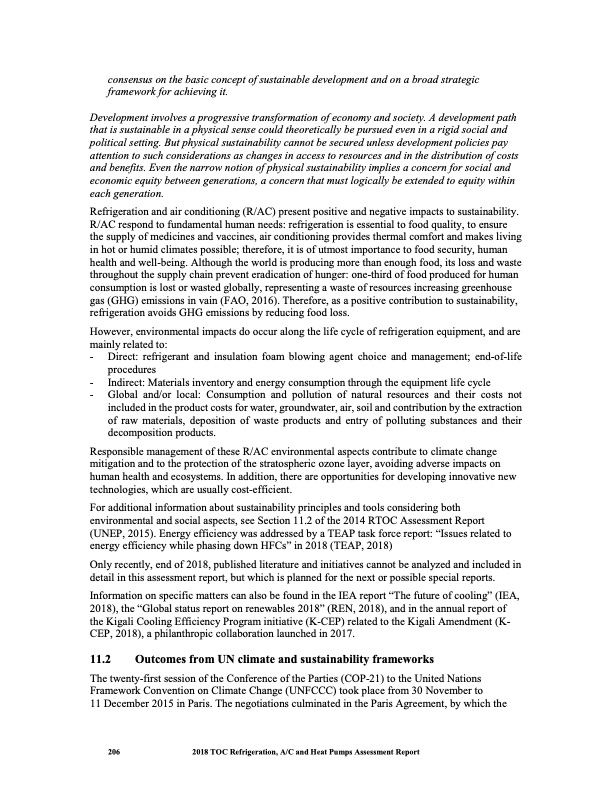
PDF Publication Title:
Text from PDF Page: 219
consensus on the basic concept of sustainable development and on a broad strategic framework for achieving it. Development involves a progressive transformation of economy and society. A development path that is sustainable in a physical sense could theoretically be pursued even in a rigid social and political setting. But physical sustainability cannot be secured unless development policies pay attention to such considerations as changes in access to resources and in the distribution of costs and benefits. Even the narrow notion of physical sustainability implies a concern for social and economic equity between generations, a concern that must logically be extended to equity within each generation. Refrigeration and air conditioning (R/AC) present positive and negative impacts to sustainability. R/AC respond to fundamental human needs: refrigeration is essential to food quality, to ensure the supply of medicines and vaccines, air conditioning provides thermal comfort and makes living in hot or humid climates possible; therefore, it is of utmost importance to food security, human health and well-being. Although the world is producing more than enough food, its loss and waste throughout the supply chain prevent eradication of hunger: one-third of food produced for human consumption is lost or wasted globally, representing a waste of resources increasing greenhouse gas (GHG) emissions in vain (FAO, 2016). Therefore, as a positive contribution to sustainability, refrigeration avoids GHG emissions by reducing food loss. However, environmental impacts do occur along the life cycle of refrigeration equipment, and are mainly related to: - Direct: refrigerant and insulation foam blowing agent choice and management; end-of-life procedures - Indirect: Materials inventory and energy consumption through the equipment life cycle - Global and/or local: Consumption and pollution of natural resources and their costs not included in the product costs for water, groundwater, air, soil and contribution by the extraction of raw materials, deposition of waste products and entry of polluting substances and their decomposition products. Responsible management of these R/AC environmental aspects contribute to climate change mitigation and to the protection of the stratospheric ozone layer, avoiding adverse impacts on human health and ecosystems. In addition, there are opportunities for developing innovative new technologies, which are usually cost-efficient. For additional information about sustainability principles and tools considering both environmental and social aspects, see Section 11.2 of the 2014 RTOC Assessment Report (UNEP, 2015). Energy efficiency was addressed by a TEAP task force report: “Issues related to energy efficiency while phasing down HFCs” in 2018 (TEAP, 2018) Only recently, end of 2018, published literature and initiatives cannot be analyzed and included in detail in this assessment report, but which is planned for the next or possible special reports. Information on specific matters can also be found in the IEA report “The future of cooling” (IEA, 2018), the “Global status report on renewables 2018” (REN, 2018), and in the annual report of the Kigali Cooling Efficiency Program initiative (K-CEP) related to the Kigali Amendment (K- CEP, 2018), a philanthropic collaboration launched in 2017. 11.2 Outcomes from UN climate and sustainability frameworks The twenty-first session of the Conference of the Parties (COP-21) to the United Nations Framework Convention on Climate Change (UNFCCC) took place from 30 November to 11 December 2015 in Paris. The negotiations culminated in the Paris Agreement, by which the 206 2018 TOC Refrigeration, A/C and Heat Pumps Assessment ReportPDF Image | Heat Pumps Technical Options

PDF Search Title:
Heat Pumps Technical OptionsOriginal File Name Searched:
RTOC-assessment-report-2018_0.pdfDIY PDF Search: Google It | Yahoo | Bing
CO2 Organic Rankine Cycle Experimenter Platform The supercritical CO2 phase change system is both a heat pump and organic rankine cycle which can be used for those purposes and as a supercritical extractor for advanced subcritical and supercritical extraction technology. Uses include producing nanoparticles, precious metal CO2 extraction, lithium battery recycling, and other applications... More Info
Heat Pumps CO2 ORC Heat Pump System Platform More Info
| CONTACT TEL: 608-238-6001 Email: greg@infinityturbine.com | RSS | AMP |